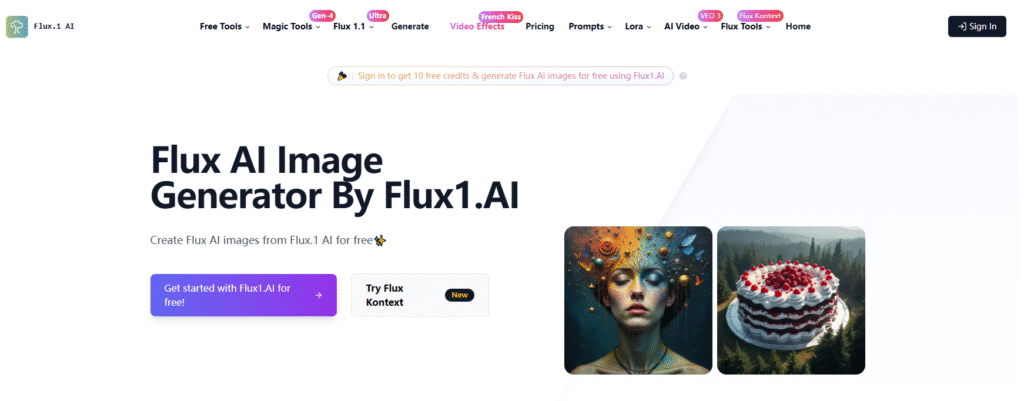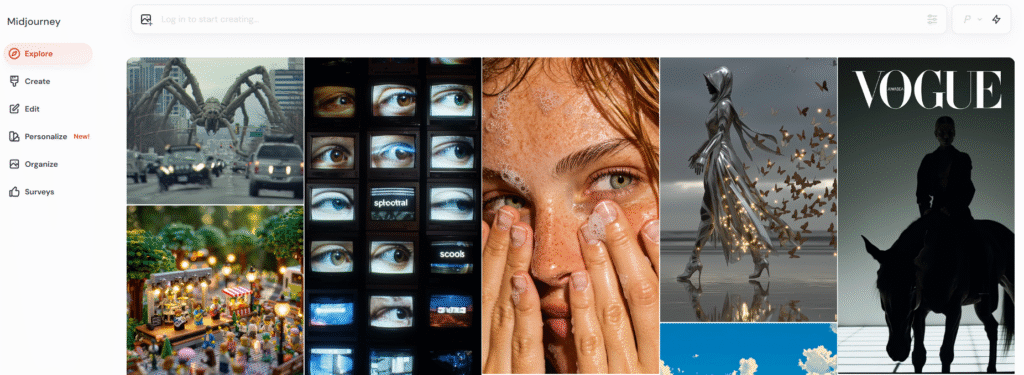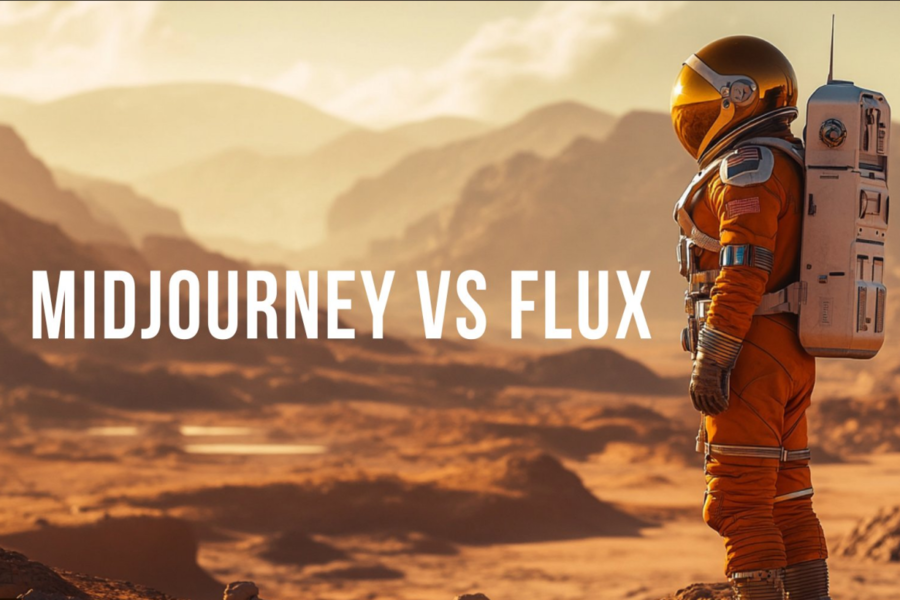Ever had that moment when you spend hours on a creative project, only to realize it doesn’t quite match the vision in your head? AI art tools like Flux and Midjourney have changed the game, letting you transform rough ideas into stunning visuals in minutes. But with so many options, how do you choose the right one?
In this Flux vs Midjourney showdown, we’ll break down their key features, strengths, and weaknesses to help you decide which AI art generator fits your workflow.
Whether you’re a digital artist, designer, or just exploring AI creativity, this guide will give you the insights you need.
What is Flux?
Imagine an AI that takes your rough sketches and turns them into polished artwork in seconds—that’s Flux. While newer than some competitors, Flux has quickly gained a reputation for its precision and speed, making it a favorite among artists who prefer hands-on control.
Flux uses diffusion models to refine and enhance your input, whether it’s a quick doodle or a detailed concept. It’s perfect for artists who want to iterate quickly without sacrificing quality.

Key Features of Flux
- Sketch-to-Image Optimization – Unlike generic AI tools, Flux excels at turning rough sketches into refined artwork, making it ideal for concept artists and illustrators.
- User-Friendly Interface – Its clean, intuitive design lets you tweak details without digging through endless menus.
- Fast & Flexible – Generate high-quality images in seconds and make real-time edits without starting over.
- High-Resolution Outputs – Perfect for professional use, from client presentations to print projects.
Pros and Cons of Flux
Pros:
- Blazing-fast generation speeds
- Professional-grade image quality
- Affordable pricing with a free tier
- Beginner-friendly yet powerful for pros
Cons:
- Requires an internet connection (no offline mode)
- Usage limits on lower-tier plans
What is Midjourney?
If Flux is your hands-on creative assistant, Midjourney is the mysterious artist who turns your wildest ideas into breathtaking visuals. Known for its dreamy, stylized outputs, Midjourney has become a go-to for generating AI art with a strong aesthetic flair.
Unlike Flux, Midjourney can also operate on Discord. You type a text prompt, and the AI generates stunning images right in your chat window. It’s perfect for those who want to experiment with different styles without getting bogged down in technical details.

Key Features of Midjourney
- Unmatched Artistic Style – Midjourney’s AI excels at mood, texture, and unique aesthetics, making it ideal for evocative, gallery-worthy art.
- Discord-Based Workflow – No software installation needed—just join the server and start creating.
- Vibrant Community – Get inspiration from other artists and learn new techniques through shared prompts.
Pros and Cons of Midjourney
Pros:
- Stunning, high-detail artwork from simple prompts
- No prior art skills required
- Constantly evolving with new updates
Cons:
- Limited customer support
- Requires prompt tweaking for precise results
- No free plan beyond initial trials
Flux Vs Midjourney: Key Differences
Now, let’s compare these two AI art titans head-to-head.
1. Speed and Efficiency
For many creators, time is the most valuable resource. This is where Flux shines. It’s built for rapid-fire iteration, allowing you to test out dozens of ideas in the time it takes to get your morning coffee. If your workflow demands quick turnaround times and the ability to pivot on a dime, Flux is the clear winner.
Midjourney, on the other hand, is a bit more like a traditional artist. It takes its time to perfect the details—the lighting, the textures, the overall mood. The wait is a little longer, but the result often feels more considered and complete.
Verdict: Flux is for speed and iteration; Midjourney is for considered, high-quality output.
2. Quality of Generated Art
This isn’t about which one is “better,” but rather about what kind of art they excel at creating.
Flux produces visuals that are sharp, precise, and professional. It’s perfect for technical illustrations, product mockups, and designs that require clean lines and accurate details. The art is professional and serves a clear purpose.
Midjourney’s art is all about the soul and the “wow factor.” The textures are richer, the colors are more vibrant, and there’s a distinct, painterly quality to the output. It’s ideal for posters, social media visuals, or any project where evoking a strong emotional response is the primary goal.
Verdict: Flux is for precision; Midjourney is for style.
3. User Interface and Usability
This is arguably the biggest point of divergence.
Midjourney’s home on Discord is either a brilliant move or a bizarre choice, depending on your perspective. If you’re already a Discord power user, its command-line interface will feel natural. But if you’re accustomed to clickable menus and visual dashboards, it can feel like a steep learning curve.
Flux, by contrast, uses a familiar, web-based interface. It’s clean, well-organized, and feels like other design software you’ve used. This makes it incredibly easy to learn and navigate, with buttons and settings exactly where you’d expect them to be.
Verdict: Midjourney is for command-line simplicity; Flux is for visual, intuitive design.
4. Integration and Community
Midjourney’s reliance on Discord is a feature, not a bug. It fosters a massive, active community where you can instantly share work, get feedback, and even collaborate with others. It’s a social and seamless way to create and connect.
Flux is a standalone tool. It does one thing—generate art—and does it exceptionally well, but it doesn’t have the same built-in community or social features. If you prefer to work in a focused, independent environment without the distractions of a social feed, this might be a plus.
Verdict: Midjourney is for community and social integration; Flux is for focused, standalone work.
Conclusion on Flux vs Midjourney
Both Flux and Midjourney are powerful AI art tools, but they cater to different needs. Flux is the speedy, precise choice for professionals, while Midjourney is the dreamy, artistic option for those who love experimentation.
Why not try both and see which one sparks your creativity? The best tool is the one that feels like an extension of your imagination.



